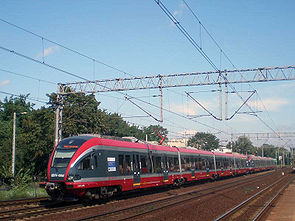
PKP Intercity
Encyclopedia

PKP Group
PKP Group is a Polish conglomerate founded in 2001 from the former single national rail operator, Polskie Koleje Państwowe. The purpose of this change was to match European Union directives of dividing transport service from rail system management and founding separate companies able to sell their...
responsible for long-distance passenger transport. It runs about 350 trains daily, connecting mainly large aglomerations and smaller towns, also servicing most of the international trains.
The company runs the following train categories:
- High-standard trains
- Ekspres InterCityInter-city railInter-city rail services are express passenger train services that cover longer distances than commuter or regional trains.There is no precise definition of inter-city rail. Its meaning may vary from country to country...
(EIC, EkspresIC) - domestic high standard trains with obligatory reservation - EuroCityEuroCityEuroCity, abbreviated EC, denotes an international train service within the European inter-city rail network. In contrast to trains with the "IC" label, "EC" trains are international trains that meet certain criteria. The EuroCity label replaces the older Trans Europ Express name for...
(EC) - international high standard trains, reservation obligatory on domestic routes - EuroNightEuroNightEuroNight, abbreviated EN, denotes all main-line national and international night train services within the European inter-city rail network. Unlike the equivalent day-running counterparts EuroCity and InterCity trains, the EuroNight trains tend to run during the nighttime and are equipped with...
(EN) - international night trains with obligatory reservation
- Ekspres InterCity
- Mid-range trains
- ExpressExpress trainExpress trains are a form of rail service. Express trains make only a small number of stops, instead of stopping at every single station...
(Ex) - domestic trains with obligatory reservation
- Express
- Economy trains
- TLK (Twoje Linie Kolejowe, "Your Rail Lines"; until 2010 called Tanie Linie Kolejowe, "Cheap Rail Lines") – cheap express trainExpress trainExpress trains are a form of rail service. Express trains make only a small number of stops, instead of stopping at every single station...
s with obligatory reservation in the 1st class, no reservaton in 2nd class; some night TLK trains provide couchetteCouchette carThe couchette car is a railroad car conveying basic non-private sleeping accommodation.The car is divided into a number of compartments accessed from the side corridor of the car, which in daytime are configured with a bench seat along each long side of the compartment...
and sleeper carSleeper carSleeper car may refer to:* Sleeping car, a railroad passenger car that can accommodate its passengers in beds* Sleeper , a car that has an unassuming exterior but is capable of high performance...
s; sleeper cars and couchettes must be reserved. Most of the TLK trains have 1st and 2nd class cars, but some (especially on shorter routes) are 2nd-class only. - Międzynarodowy (M) - international fast train with TLK standard and fare (lower standard than EuroCity)
- Międzynarodowy nocny - international night train (lower standard than EuroNight)
- TLK (Twoje Linie Kolejowe, "Your Rail Lines"; until 2010 called Tanie Linie Kolejowe, "Cheap Rail Lines") – cheap express train
A high speed rail
High-speed rail in Poland
As of December 2009, Poland had 700–800 km of railways suited for rail transport reaching 160 km/h. An additional 1,500 km are expected by 2015, including some sections allowing 200 km/h. While previously the Polish government had invested primarily in Poland's road network,...
system is planned.

Most of the EkspresInterCity trains were degraded to the re-introduced Express category on June 1st, 2011.
PKP Intercity also operates a bus
Coach (vehicle)
A coach is a large motor vehicle, a type of bus, used for conveying passengers on excursions and on longer distance express coach scheduled transport between cities - or even between countries...
service on the route Warsaw-Vilnius
Vilnius
Vilnius is the capital of Lithuania, and its largest city, with a population of 560,190 as of 2010. It is the seat of the Vilnius city municipality and of the Vilnius district municipality. It is also the capital of Vilnius County...
.
History
The company was founded after splitting Polskie Koleje PaństwowePolskie Koleje Panstwowe
is the dominant railway operator in Poland.The company was founded when the former state-owned operator was divided into several units based on the requirements laid down by the European Union...
(national rail operator) into several companies to meet European Union
European Union
The European Union is an economic and political union of 27 independent member states which are located primarily in Europe. The EU traces its origins from the European Coal and Steel Community and the European Economic Community , formed by six countries in 1958...
Standards.
See also
- Transportation in Poland
- List of railway companies
- Polish locomotives designation
- PKP locomotives
- PKP GroupPKP GroupPKP Group is a Polish conglomerate founded in 2001 from the former single national rail operator, Polskie Koleje Państwowe. The purpose of this change was to match European Union directives of dividing transport service from rail system management and founding separate companies able to sell their...

